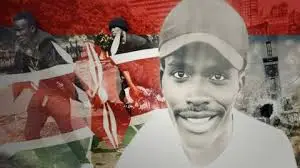Introduction
The BBC’s Africa Eye documentary, Blood Parliament, presents a chilling and detailed account of this horrific event. On June 25, 2024, a day that would go down in history as a tragic turning point, Kenya’s political landscape was forever altered. The streets of Nairobi typically vibrant with life, became a battleground as thousands of citizens took to the streets to protest the controversial 2024 Finance Bill. What started as a peaceful demonstration outside Parliament soon escalated into violent clashes, leaving at least three people dead — including students, Sunday school teachers and young protestors. Through in depth investigative journalism, interviews, and compelling visuals, the documentary sheds light on the controversial issues surrounding the protests, the use of force and the aftermath.
📽️ Inside the Documentary: A Deep dive Into the Protests
The Blood Parliament documentary offers viewers an unsettling look at the chain of events that led to the bloodshed. By combining first-hand accounts, eye-witness testimonies and authentic footage captured by on-the-ground reporters, the film reconstructs the timeline of violence. The most disturbing aspect of the documentary is the alleged use of excessive force by law enforcement officers. While protestors were initially met with tear gas and batons, the situation soon escalated when live ammunition was reportedly used to disperse the crowd. The film raises important questions: Who gave the order to shoot? Why has there been a lack of transparency or accountability? The BBC team has uncovered evidence that suggests an organized effort to suppress dissent, making this documentary a critical piece in understanding the socio-political climate in Kenya.
The documentary dives into the heart of the issue — the 2024 Finance Bill. Introduced by the government, the bill sought to implement new taxes and austerity measures that many felt would burden the already struggling Kenyan populace. From student unions to workers’ organizations, the bill faced opposition from numerous groups, all of whom were keen to voice their grievances. Protestors, many of whom were students, felt that the bill unfairly targeted the poor while providing little relief to the affluent.
🗣️ Public and political reactions: Dividing the Nation
The documentary’s release has sparked a frenzied national debate in Kenya. On social media platforms, online forums, and news outlets, Kenyans have voiced their opinions on the tragic events. Many have expressed outrage at the government’s use of force against unarmed citizens, while others have questioned the timing and intentions behind the protests.
Critics of the documentary have been vocal, especially among some Members of Parliament (MPs), who argue that the BBC’s portrayal of events was biased. In a televised interview, one MP stated that the country had “moved on” from the incident and that the documentary only “served to further divide the country.” These statements, however, have been met with backlash, with many asserting that ignoring the events and their aftermath is part of the larger systemic problem.
The documentary has also gained attention from human rights organizations such as Amnesty International, which has called for a thorough investigation into the excessive use of force and the lack of justice for the victims. This marks a crucial moment for Kenya, as the world watches how the government will respond to such allegations.
🌍 Broader Implications: Media, Civil Rights and State Authority
The implications of this documentary stretch far beyond just the events surrounding the 2024 Finance Bill protests. Blood Parliament raises pressing concerns about freedom of expression and citizen rights in Kenya. What does it mean when a government takes a stand against peaceful protestors? How can media outlets like the BBC navigate these complex, often dangerous narratives in their coverage?
The role of media is undeniably crucial. Without documentaries like Blood Parliament, these tragedies might go unnoticed or be misrepresented. As Kenya’s democracy matures, the balance between state authority and citizen rights remains a delicate one. While governments are tasked with ensuring order, citizens have the right to express dissatisfaction with policies they believe harm them.
For many, the documentary has been a wake-up call — not just about the current state of politics in Kenya but about the power of visual storytelling in shaping public opinion and holding power to account. Blood Parliament underscores the importance of holding institutions accountable, regardless of political affiliations, and reminds us of the power of the press to amplify the voices of the marginalized.
🔗 Where to Watch the Documentary
For those seeking to understand the full scope of the event and its impact, the full documentary can be viewed on the BBC Africa Eye YouTube channel. It offers both a visual and narrative account that is essential for anyone looking to gain a comprehensive understanding of the incident. Watch here:
Blood Parliament – BBC Africa Eye Documentary
Follow TopStoriesKe for more.



